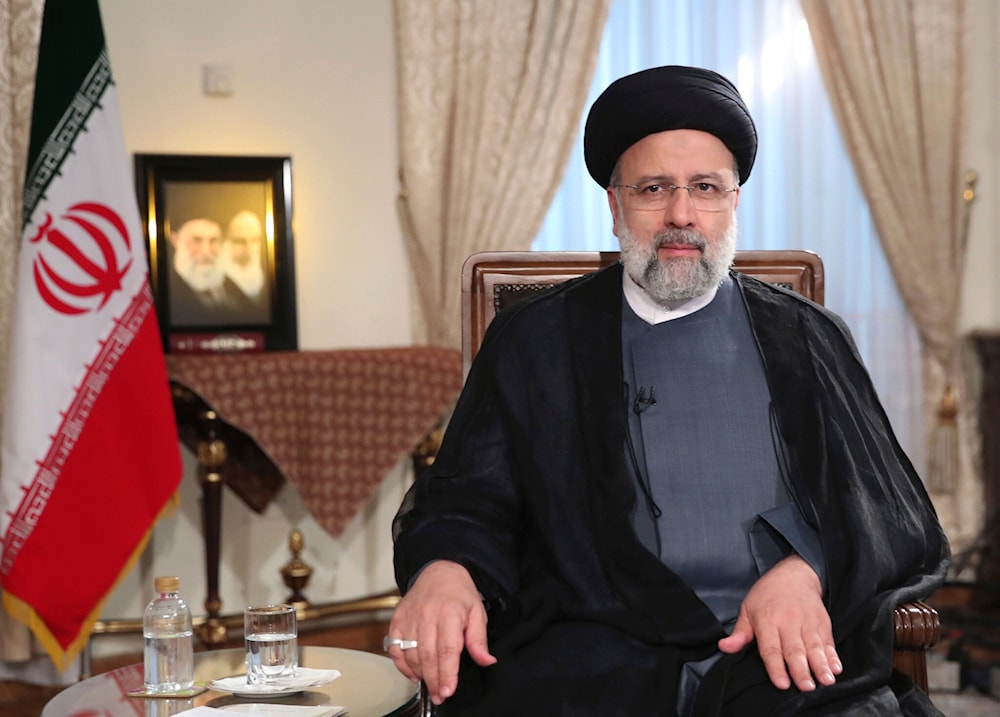Iran's Raisi heads to Pakistan to discuss relations, economic projects
Iranian President Ebrahim Raisi and an Iranian delegation are heading to Pakistan to develop bilateral ties and discuss economic prospects between both nations.
-

President Ebrahim Raisi attends a live televised interview with state-run TV, at the presidency office in Tehran, Iran, Sept. 4, 2021. (Iranian Presidency Office via AP)
Iranian President Ebrahim Raisi is set to visit Islamabad for talks with his Pakistani counterpart Asif Ali Zardari, aimed at developing relations following the fatal cross-border operations conducted on the countries' shared border.
Iran's Foreign Ministry stated that the delegation, led by Raisi, also includes the foreign minister and a large business delegation.
Meeting following high tensions
Back in January, both nations saw tit-for-tat cross-border hostilities, which further triggered regional tensions amid the genocide in Gaza.
However, following the incidents, and during a call with his Pakistani counterpart Jalil Abbas Jilani, Iranian Foreign Minister, Hossein Amir-Abdollahian stated that terrorists would never come between Iran and Pakistan improving their relationship, adding that the terrorists based along the Iran-Pakistan border areas are supported by hostile third parties.
He stated that many Iranian and Pakistani personnel have lost their lives in recent years in the fight against terrorism, emphasizing that this only pushes both countries to unite their strengths in fighting terrorism.
The call came a few days after Iran launched simultaneous drone and missile attacks on two bases of Jaish ul-Adl, a terrorist group formed in 2012, in Pakistan.
Jaish ul-Adl had targeted Iranian police and civilians with numerous terror attacks in the past years.
Moreover, both presidents agreed that the development of bilateral ties between the two nations was being sabotaged by colonial powers.
Iran, Pakistan pledge to advance IP gas project deal
Raisi's itinerary also includes trips to Lahore and Karachi for meetings with provincial leaders, as stated in the announcement. Additionally, the nations aim to bolster their relationship and improve collaboration in areas such as trade, connectivity, energy, agriculture, and interpersonal interactions.
This comes as a decision passed by Pakistan's federal cabinet for an 80-kilometer segment of the pipeline from Gwadar to the Iranian border, which would allow the country to save over $5 billion a year by buying gas from Iran.
Pakistan’s Geo News reported that the Cabinet Committee on Energy (CCoE) approved the launch of works during the first phase of the Iran-Pakistan (IP) gas pipeline, which would increase Pakistan’s energy security.
The pipeline, which extends from the Iranian borderline to Gwadar port city in Balochistan province, is estimated to cost 45 billion Pakistani rupees, while some knowledgeable sources reveal that Pakistan could avoid an $18 billion fine with this project.
In 2013, the US threatened Pakistan with economic sanctions over the Iran-Pakistan gas project, citing concerns about Iran's alleged nuclear program. The project, also known as the "Peace Pipeline", was conceived in 1994 and initially involved India.
However, due to various challenges, including US pressure and India's shift towards the Turkmenistan-Afghanistan-Pakistan-India (TAPI) pipeline, the IP project faced delays.
This past November, Iranian and Pakistani energy ministers pledged to take effective steps in advancing the Iran-Pakistan (IP) gas project deal.

 3 Min Read
3 Min Read








